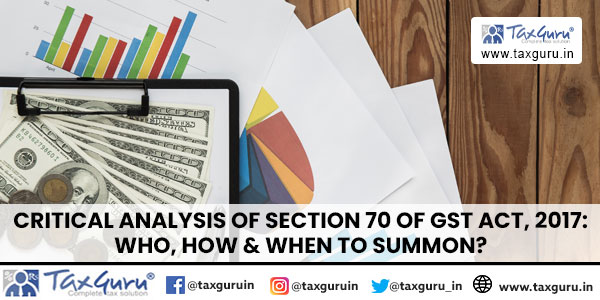The Central Goods and Services Tax Act, 2017, through Section 70, gives authorities the right to summon any person for inquiry. This paper, therefore, takes the discussion a little further to understand in detail how the section is exercised, what power it grants, and in which circumstances it is invoked.
Critical Provisions of Section 70
Summoning Powers:
Section 70(1) vests in the “proper officer” the power to summon any person whose appearance it appears to the inquiring authority to be necessary for:
- Giving evidence.
- Production of documents or other evidence material to an inquiry.
Statutory Provision:
The summons power vested in Section 70 is comparable to that vested in a civil court by the Code of Civil Procedure, 1908. The said power comprises:
- Attendance could be enforced
- Production of documents compelled
- Examining individuals under oath.
Application
The section is applied to all the taxpayers, individual or business/representative in possession of material which relates to an investigation that is in the process or assessment under this Act.
How Tax Authorities Use Section 70
1. Investigation on Tax Evasion
Section 70 is mostly applied at the time of investigating suspected cases of tax evasion.
For example,
- Discrepancies appear in GST returns submitted by the business.
- Cases where declared turn-over shows unpredictable changes from the actual transactions done.
- In cases of undervalued interstate supplies or unreported transactions.
- An officer summons individual to clarify the matter, for proof, or supporting documents whether GST laws are violated or not.
2. Confirmation of ITC Claims
A person may make a Section 70 invocation, mainly to verify an ITC claim. This is true in cases:
- When there exists a mismatch between GSTR-2A (supply filed by suppliers) and GSTR-3B (return filed by recipient).
- Suspected use of fake invoices in claiming ITC.
- The auditor may ask a person to furnish purchase invoices, transportation records or banking details relating to the case of the assesses.
3. Proceedings for Audit and Assessment
As part of an audit or an assessment, under Section 70 authorities can summon an individual to make the following entries:
- Rectify discrepancies in record.
- Explain abnormal patterns in trade or tax payments.
- Also, explain supply valuation, in particular, inter-se transactions.

4. Investigating Fraud Activities
- Cases of fraudulent GST registrations, creation of shell companies, or fictitious transactions always require the application of Section 70.
- Directors, partners, or authorized signatories of such entities are summoned to provide details of operations, contracts, and transactions by tax authorities.
5. Multi-Party Investigation
In complex cases involving multiple parties, Section 70 is invoked to summon different individuals, including suppliers, buyers, transporters, and intermediaries, in order to stitch together the sequence of events.
When Section 70 is Called Upon
1. Non- or Delayed Filing of Returns
If the taxpayers fail to file their GST returns or delay the same without adequate cause, then they can be called upon to explain the default.
2. Tax Mismatches or Defaults
When the business reports lower turnover, classifies wrong goods/services, or uses inappropriate GST rates, it may be called upon to clarify its tax status.
3. Suspicious Transactions
Authorities can resort to Section 70 in case of suspicious transactions, including the following:
- Large cash transactions
- Unrecorded interstate supplies
- Several transactions with high-risk customers or suppliers
4. Non-Cooperation with Inspections or Audits
In case the taxpayers do not cooperate with the inspections and fail to present relevant records during the audit process, they will be summoned.
5. Investigations Based on Information from Third Parties
Tax authorities often receive information from third parties such as banks, suppliers, or whistleblowers. If this information suggests possible violations, Section 70 may be invoked to summon the concerned individual for further investigation.
Guidelines for Use of Section 70
To prevent misuse, the Central Board of Indirect Taxes and Customs (CBIC) has issued guidelines for officers exercising the power to summon under Section 70:
- Summons must be issued only when absolutely necessary and alternative measures such as a notice have been tried and found ineffective.
- All reasons for serving the summons shall be recorded in writing.
- Summons must not be issued for effecting routine compliance.
- Senior officers must monitor the practice of summons issuance to avoid harassment of taxpayers.
Amendment Allowing Authorized Representatives
A recent amendment, effective from November 2024, allows taxpayers to appoint authorized representatives to appear on their behalf when summoned under Section 70. This change is aimed at:
- Reducing personal inconvenience for taxpayers.
- Providing professional expertise during summons proceedings.
- Enhancing transparency and taxpayer confidence.
Conclusion
Section 70 of the GST Act, 2017, is a powerful tool for ensuring compliance and investigating violations. However, its judicious use is essential to balance the needs of tax administration with taxpayer rights. With the introduction of amendments and guidelines, the framework is evolving towards a more transparent and taxpayer-friendly system.
Taxpayers should be vigilant about their rights and obligations under Section 70 and seek professional advice when served with a summons to ensure that the process is smooth and not complicated.





